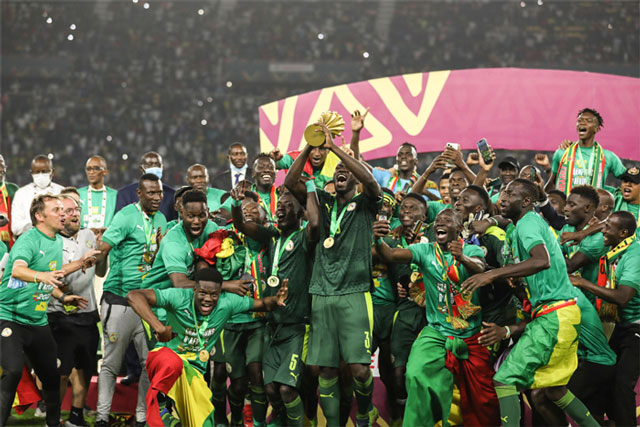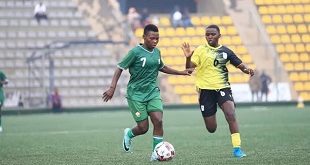
Kampala, Uganda | THE INDEPENDENT | As the 2022 FIFA World Cup Qatar draws closer, African countries that will be representing the continent are finalizing preparations for the world’s biggest football tournament.
All have already drawn their list of players that will take part in the tournament. But the continent’s representatives will have to punch above their weight in the Qatar edition to shine in the championship where no African nation has ever advanced past the last eight (quarter-final).
The best that African representatives have done in the previous editions of the tournament is qualifying for the quarter-finals in 1990, 2002, and 2010 but have so far failed to break the jinx.
Cameroon, Morocco, Senegal, Tunisia, and Ghana will represent Africa at the Qatar World Cup, which will take place from 20 November to 18 December and all five countries have previously appeared in football’s largest tournament.
Cameroon, famously known as the “Indomitable Lions” was the first team to reach the quarter-finals during the famous Italia 90, after stunning reigning champions Argentina in the opening match, finishing top of the group ahead of Romania, and then defeating Colombia 2-1 after extra time to reach the quarter-finals thanks to two goals from the legendary Roger Mila.
Their performance against Colombia in the round of sixteen was widely thought to signal a new era of achievement, seeing an African country reaching the semi-final, but the hope didn’t last for long before they succumbed to England 2-3 after extra time under controversial refereeing seen by many as blatant bias.
In 2002, Senegal commonly identified as the “Lions of Terranga” produced another steller performance beating reigning champions France in the first match and becoming the first African team to go through a World Cup group stage undefeated. Senegal further eliminated Denmark in the round of the last sixteen to play the quarter-final match against Turkey, which they eventually lost.
In 2010 when the tournament was hosted by South Africa, Ghana pulled off an impeccable performance when they finished second in Group D to qualify for the round of sixteen. In the group, they beat Serbia, drew with Australia, and lost to Germany. They would later eliminate the United States of America to play a quarter-final with Uruguay which eliminated them
But among the three, Ghana was perhaps the most unlucky. As their quarter-final match neared its climax with the two teams still tied in a one-all draw, the Ghanaians had an opportunity to seal a victory, but a woud be game-changing goal was blocked from entering the goal with a handball by Uruguayan striker Luis Suarez. Although Suarez was sent off, Ghana missed the resulting penalty, as well as losing the subsequent penalty shoot-out.
Africa’s Representatives at the 2022 World Cup
Senegal, the reigning African champion, will lead Africa’s representation in this tournament. Senegal is in Group A, along with hosts Qatar, Ecuador, and the Netherlands. Head Coach Aliou Cisse is hopeful that the AFCON Champions will rely on experience and squad depth to make it a memorable campaign in the desert country.
They however enter the championship with an injury scare of their striker and perhaps their best player Sadio Mane who was injured on Tuesday while playing with his club Bayern Munich, but coach Cisse included him in the squad despite picking up a late injury.
“I chose to keep him in the group because it is a situation we have already experienced, to a lesser degree, with Ismaila Sarr at the African Cup of Nations (AFCON 2021),” Cisse told the press explaining why he included Mane in the team. “We were able to handle that situation. Sadio is a special player on our team. So, it is important to continue to monitor his injury, hoping that in two or three weeks, there will be some change. We are really optimistic.”
Cameroon, another African Nation will be making its eighth World Cup appearance in Qatar. This time they face Switzerland, Serbia, and tournament favorite Brazil in their group. The Indomitable Lions’ best hope is to take points from games against Switzerland and Serbia.
They were one of the best teams in the 2021 edition of the African Cup of Nations but succumbed to Egypt in the semi-finals. They will travel to Qatar with a number of seasoned players, including captain Vincent Aboubakar and Bayern Munich attacker Eric Maxim Choupo-Moting.
Tunisia on the other hand enters the championship with new manager Jalal Qaderi who took charge in January after Mondher Kebaier was sacked for a poor performance at the Africa Cup of Nations.
Tunisia will be competing in their sixth World Cup, but they have never advanced past the group stage. They are in group D alongside Denmark, Australia, and the defending champions France. Coach Jalal previously told A{ news that their major goal is to advance past the group stage, albeit admitting that it is a tough challenge.
“It’s my personal ambition. If we don’t get through, I will not have succeeded in my mission, despite the toughness of the task, we want to make our dream come true and get through to the knockout round,” he said.
Morocco is another African team at the event regarded as one of the strongest teams on the African continent. They are in Group F with tough opponents including previous edition’s finalists Croatia, Belgium, and Canada.
They boast a number of top-tier European league players, notably former Southampton attacker Sofiane Boufal, Sevilla’s Youssef En-Nesyri, and Ashraf Hakimi, who plays for Paris Saint-Germaine- PSG in France. The biggest highlight in the squad was the return of Hakim Ziyech who plays for English Premier League side Chelsea.
Ziyech had fallen out with former Morocco coach Vahid Halilhodzic, but new coach Walid Regragui wasted little time in recalling Ziyech and started him in the first two games he presided over, against Chile and Paraguay in September, and he has once again included him the world cup squad.
Ghana is the other African team in the great tournament. Ghana will be competing in their fourth World Cup, trying to reach the knockout stages for the third time after 2006 and 2010. They will compete in an extremely challenging Group H that includes Portugal, South Korea, and their bitter rival Uruguay.
Meanwhile, the inability of African teams to overcome the long-lasting challenge of failing to qualify for the semi-final is linked to Africa’s limited number of World Cup slots. For a continent with 54 member countries, it only gets five spots and this started in 1998.
In contrast, South America, which has only 10 qualifying nations, receives between four and five slots, and Europe, which has 55 eligible nations, receives 13. Therefore, from a purely statistical perspective, this significantly lowers Africa’s chances of impressing at the world cup.
*****
URN
 The Independent Uganda: You get the Truth we Pay the Price
The Independent Uganda: You get the Truth we Pay the Price


